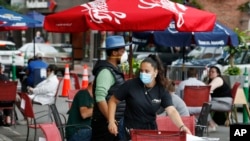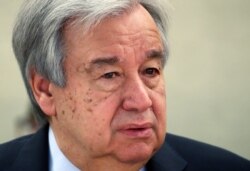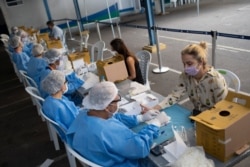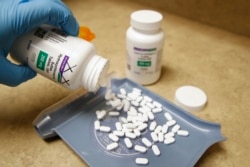The United States, the world leader in COVID-19 infections and deaths, continues to set new daily records for coronavirus infections.
U.S. states reported more than 76,400 cases Friday, the second time reported infections for a single day exceeded 70,000 and the 11th time in the past month a single-day record had been set.
The U.S. has more than 3.67 million of the world’s 14.1 million COVID-19 infections, according to Johns Hopkins University statistics, largely because of surges in Arizona, California, Florida, Georgia and Texas.
The surges come as the U.S. lacks a clear national plan to contain the spread of the coronavirus and no requirement for people to wear protective masks in public.
“I want people to have a certain freedom, and I don’t believe in that,” President Donald Trump said in an interview with Fox News that is scheduled to air Sunday.
Meanwhile, U.N. Secretary-General Antonio Guterres called Saturday for an end to worldwide inequalities that triggered recent anti-racism protests and have been further exposed by the coronavirus pandemic.
“COVID-19 has been likened to an X-ray, revealing the fractures in the fragile skeleton of the societies we have built,” Guterres said at an event in Johannesburg marking what would have been former South African President Nelson Mandela’s 102nd birthday.
Stunning statistic on wealth
To help make his point, Guterres said the world’s 26 richest people have as much wealth as half the world’s population. He accused developed countries of investing in their own survival and said they had “failed to deliver the support needed to help the developing world through these dangerous times.”
Brazil follows the U.S. with 2 million cases and India comes in third with 1 million infections, according to Johns Hopkins statistics.
Brazilian health experts blame their federal government for the country’s large number of cases.
“The virus would have been difficult to stop anyway. But this milestone of 2 million cases, which is very underestimated, shows this could have been different,” said Dr. Adriano Massuda, a health care professor at Sao Paulo’s Getulio Vargas Foundation University. “There’s no national strategy for testing, no measures from the top ... too little effort to improve basic care so we find serious cases before they become too serious, no tracking.”
Although the number of cases appears to be ebbing in some of the larger Brazilian cities, the disease is now starting to hit places that had been spared.
The World Health Organization said Friday that Brazil was "still in the middle of this fight."
EU session
In Europe, leaders gathered in Brussels on Saturday, the last day of a two-day meeting to negotiate the terms of an $855 billion economic rescue plan. As of Saturday afternoon, there was no sign a deal was imminent. Czech Prime Minister Andrej Babis said EU leaders’ views on the stimulus plan remained "diametrically different" after Friday’s talks.
In Spain, officials asked residents of Barcelona to stay at home as much as possible to stop the spread of the virus.
Israel imposed a new weekend shutdown in an attempt to lower infection rates.
Another trial of the malaria drug hydroxychloroquine has proved it to be ineffective as an early treatment for mild cases of COVID-19, researchers at the University of Minnesota School of Medicine concluded.
“There is not convincing evidence that hydroxychloroquine can either prevent COVID-19 after exposure or reduce illness severity after developing early symptoms,” said Caleb Skipper, lead author of the study. “While disappointing, these results are consistent with an emerging body of literature that hydroxychloroquine doesn’t convey a substantial clinical benefit in people diagnosed with COVID-19, despite its activity against the coronavirus in a test tube.”
Trump had promoted hydroxychloroquine as an effective treatment early in the pandemic and said he took the drug himself. He has tested negative for the coronavirus.
After initially approving it as an emergency treatment, the U.S. Food and Drug Administration reversed itself once doctors warned of potentially deadly side effects.








